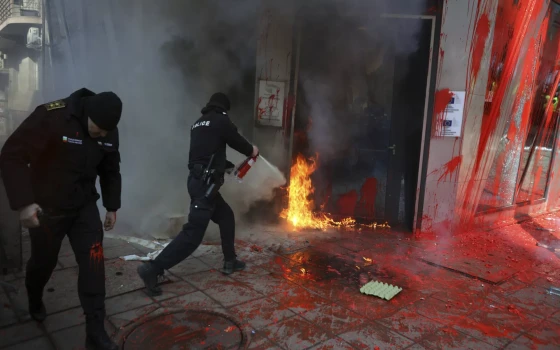
The European Union building in Sofia was vandalized.. Pro-Russian nationalists demand that the government cancel plans to join the eurozone

- Europe and Arabs
- Sunday , 23 February 2025 10:59 AM GMT
Brussels - Sofia: Europe and the Arabs
Police in the Bulgarian capital, Sofia, clashed with nationalist demonstrators demanding that the government cancel its plans to join the eurozone. This came a few days after the ministerial meeting held in Brussels, during which Temenozka Petkova, the Bulgarian Finance Minister, presented a report to her counterparts in the eurozone countries on the progress made by Bulgaria towards meeting the criteria for adopting the euro. For her part, European Commission President Ursula von der Leyen acknowledged the vandalism of a European Commission building in Sofia and said on the X website: "Abominable scenes in Sofia where our office was vandalized. In Europe, we exercise the right to demonstrate peacefully. Violence and vandalism are never the solution." According to the European news network in Brussels "Euronews", about 1,000 demonstrators gathered in front of the European Commission office in Sofia, the executive branch of the European Union, and began throwing red paint and firecrackers at the building. One of the doors was set on fire.
Firefighters were sent to the scene, in addition to police reinforcements, who pushed the demonstrators back.
Security sources said that several demonstrators were arrested, while some officers were injured during the clashes.
The demonstration, organized by pro-Russian nationalists from the pro-Russian Vazrazdan party, began earlier on Saturday outside the headquarters of the National Bank of Bulgaria.
The demonstrators demanded the government's resignation, while waving national and party flags They chanted "No to the euro" and "Yes to the Bulgarian lev," the country's currency.
"I am here to defend Bulgaria and the Bulgarian people," Vazrazdan party leader Kostadin Kostadinov told reporters.
He said his party was demanding a referendum to decide whether to join the 20-member eurozone.
"If there is no referendum, we will block the work of the National Assembly," said Kostadinov, whose party is the third-largest in parliament.
Bulgaria, which joined the European Union in 2007, has suffered from political instability over the past several years.
The new government, formed last month, has made eurozone membership a top priority that does not appear to have unanimous support. There are those who doubt Bulgaria's readiness to join the eurozone.
Some economists argue that the country lacks the economic case to join the eurozone and is not yet ready to adopt the single currency.
But the government, backed by other pro-European parties in parliament, is stressing the political importance of the adoption as another step towards deepening European integration amid rising geopolitical tensions.
In an attempt to distract the country from this goal, pro-Russian nationalists are reportedly preparing for new fierce battles and are said to be using disinformation as a tool to spread fear among the people.
In the early hours of January 1, Bulgarian Interior Minister Atanas Elkov and his Romanian counterpart Catalin Predoiu stood at the border checkpoint, located on the Danube Bridge, to mark the two countries’ formal accession to the Schengen area and grant Romanian and Bulgarian citizens the right to travel freely in Europe’s border-free zone. They took part in the celebration of the abolition of borders.












No Comments Found